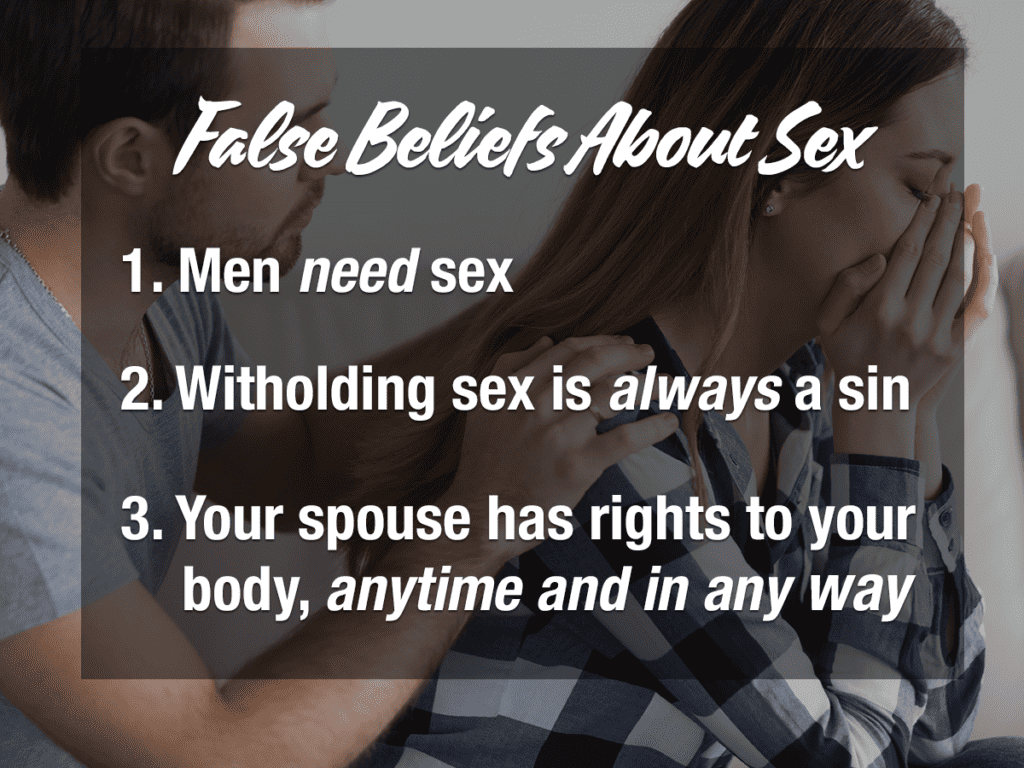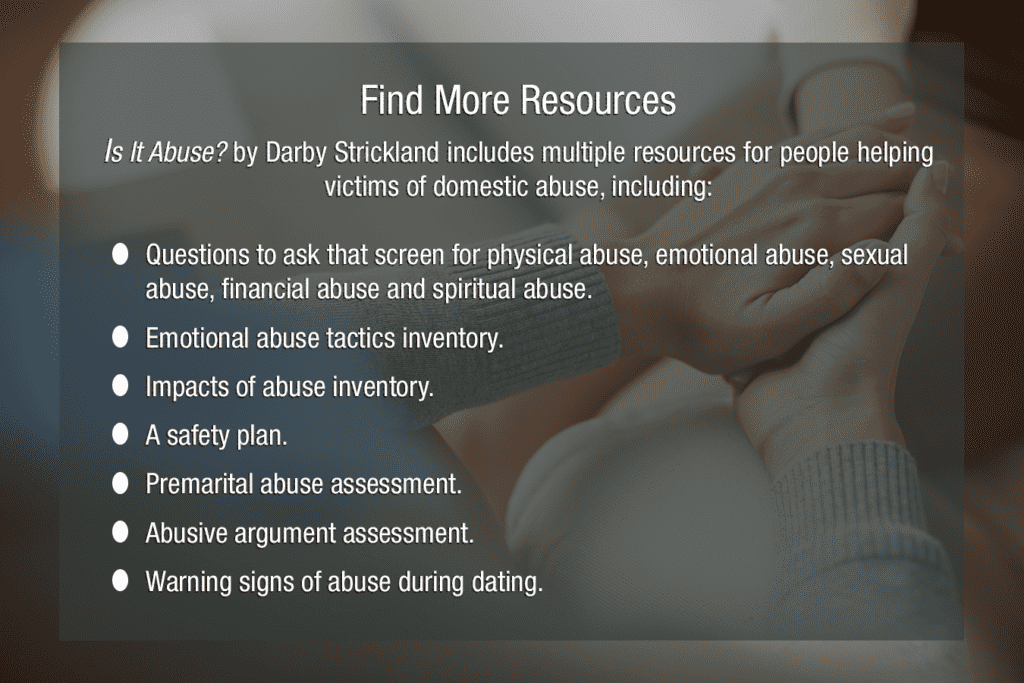Estimated reading time: 14 minutes
What exactly is sexual abuse in marriage? What if my husband pressures me sexually or feels entitled to my body? Does that count too, or does only marital sexual assault qualify? If I feel resistant to my husband’s sexual coercion and withhold sex from him, is that abuse? Am I really the problem?
These are only a few of the questions barraging a sexually abused woman’s mind. Sexual coercion and assault in marital relationships are very confusing situations to be in, and can be hard to recognize. Just remember that God loves you and the abuse you endure is not your fault. This article will walk you through each of these questions and explain why this might be happening.
Table of contents
- When a Husband Feels Entitled to a Wife’s Body
- What Is Sexual Abuse in Marriage?
- What the Definition of Sexual Abuse Doesn’t Include
- Why Does My Husband Sexually Abuse Me?
- Examples of Sexual Abuse in Marriage
- The Impact of Sexual Abuse in Marriage
- Sources of Confusion
- Common Threats from Sexual Abusers
- Careful Help for Victims of Sexual Abuse
When a Husband Feels Entitled to a Wife’s Body
A Personal Story
One day on our honeymoon I just wanted to go out for a nice dinner. When we got back, I wanted to talk and cuddle. My new husband kept advancing physically, and I put him off in a playful way.
I don’t understand what happened next.
All of a sudden, he got this odd look in his eye and said, “You cannot disrespect and reject me. Our marriage will not start off like this.” The next thing I knew, he had pinned me down and was physically forcing himself on me.
I could tell he was angry, and I felt terrified, so I didn’t resist. I had never seen him like that before. To this day, I can’t understand how he could do that to me while I was crying. Didn’t he care that he was scaring and hurting me? — Janet*
Sexual Abuse Is More Common than We’d Like to Admit
As a counselor, I’ve heard many stories of Christian women like Janet who were raped on their honeymoons. Their husbands feel entitled to their bodies and took from them. These women were conditioned early on in their marriages to be compliant or else be terrorized.
Men may be victims of domestic abuse, and Darby Strickland’s advice can be applied to them. Strickland addresses wives specifically in her advice since 85 percent of domestic abuse victims are women and Strickland’s counseling experience is with women.
When I began counseling, I didn’t realize that I needed to be alert for sexual abuse in marriage — which includes much more than physical force and rape. Now that I see its prevalence, I’m deeply concerned about the fact that many in the church remain unaware that sexual abuse even occurs in Christian marriages.
Wives often seek counsel for anxiety, depression, or sometimes even guilt that they feel about their lack of sexual desire for their husbands. These women are often unaware of what’s at the root of their suffering because they’re confused and can’t see that what’s happening to them is wrong.
Let’s first define what sexual abuse in marriage is and is not.
What Is Sexual Abuse in Marriage?
God designed a married couple’s physical relationship to express their emotional and spiritual intimacy. And more deeply than that, a couple’s love for each other is meant to be a picture of how Jesus loves us, His church.
Jesus’ love is patient, kind, faithful, self-sacrificing, accepting, honoring, honest, and caring. By God’s design, this type of love should characterize a marriage relationship — including a couple’s sexual intimacy.
Sadly, as we look at marriages that involve either sexual abuse, we encounter something very different. We see sex corrupted by those who lust to fulfill their own desires at any cost. In too many marriages, sex is not a picture of loving mutuality and intimacy but is tainted by domination and manipulation.
Marital sexual abuse is a broad term that can encompass many heinous and exploitive acts. The worst violations occur when someone demands, requires, or takes sex by force, as in instances of rape or forced sex acts. Other abusive acts include the unwanted intrusion of pornography or implements into sex, undesired sexual activities, peeking, or spying.
Sexual abuse in marriage can be manipulative and coercive. In cases of marital sexual coercion or sexual assault, an oppressor uses unrelenting pressure or threats to leverage a sexual encounter even after a victim expresses discomfort or refusal.
What the Definition of Sexual Abuse Doesn’t Include
It’s also essential for us to also clarify what marital sexual abuse in marriage is not.
Many couples struggle with differences in their sexual appetites and comfort levels. In a healthy relationship, couples can discuss, and even debate, their differing physical desires without pressure, coercion, fear, or rejection.
Spouses should be able to express different preferences without either of them imposing their desires on the other in the form of a demand.
Also, not all usage of pornography is abusive. Both the use and the creation of pornography is always sinful, but it’s not abusive unless it’s undesired. Mutually agreed upon evil behaviors are simply wrong — not abusive. Sexual abuse requires coercion.

Why Does My Husband Sexually Abuse Me?
Abuse is fueled by entitlement.
Entitlement says, “My needs and desires are the priority; it is your job to make me happy.” Abusive entitlement says, “If you fail to fulfill my desires, I will hurt you.”
Sexually abusive oppressors believe that they are entitled to sex. These husbands genuinely feel entitled to their spouse’s body. They love themselves and their own pleasure to such an extent that they will harm another person to satisfy themselves.
Years ago, I came across a study in a book called Real Rape, Real Pain: Help for women sexually assaulted by male partners. The study helped me to better understand what goes on inside an oppressor’s heart.
The study asked rapists — of both partners and strangers — why they raped. It found that whether a man rapes a stranger, his wife, or his partner, he does so for the same reasons:
- Power
- Anger
- Retaliation
- Sexual arousal from causing pain and fear
- A preference for coercive over consensual sex
- A deep sense of entitlement
Husbands do not sexually abuse their wives because sex is a biological need for them that their wives are failing to provide. They don’t do it, as many have claimed, to keep from sinning — from straying from the marriage bed.
Husbands who sexually abuse their wives do it because they love themselves and their own pleasure to such an extent that they have no self-control (Consider 2 Timothy 3:2–5). They are willing to be reckless, treacherous, brutal, and heartless. Their love for themselves knows no bounds.

Examples of Sexual Abuse in Marriage
As is the case with any sinful behavior, there tend to be patterns within sexual abuse that we can observe over time. Common characteristics of sexual abuse include:
- Unrelenting pressure
- Callous disregard
- Unwanted acts
- Sexual coercion
- Degradation
- Accusations of adultery
- Using sex as a bargaining chip
- Technological abuses
The following examples of sexual abuse in marriage are just a few stories from Christian women who are married to professing Christian men. These women’s husbands showcase how entitled they feel towards their wives’ bodies and what they are willing to do to coerce them into doing what they want.
Karen
A few weeks ago, my husband started showing me porn clips and asked me to reenact things in them with him. I try to do it, but it makes me feel dirty — and some of them are painful.
I try to tell him that this stuff is not God-honoring, but he says, “You are a prude. God gave me the most frigid, unloving wife on the planet. And if you’re not careful, I will leave you for someone who knows how to love me and fulfill her duty with joy.”
Jen
One time, after my gallbladder surgery, we hadn’t had sex for two weeks. When I went to check out at the grocery store, there was no money on our bank card. Later my husband told me that I’d been neglecting him and that I needed to know what it was like to not get what I needed.
Anne
Bob wants lots of sex. If I refuse to be intimate with him, he’s rotten to the kids the next day. He becomes so irritable and loud that even our dog cowers.
I try to interject and tell him not to be so harsh and punishing. He just barks at me, “If you want me to be in a good mood, it’s your job to put me in one.”
Many nights I’ll provide him sex just to spare the children from being hurt.
Cindy
When I was out with my church friends, Peter would call me every 20 minutes. Sometimes he would find reasons for me to put one of them on the phone to make sure that I was where I said I was.
He was convinced I was keeping a lover. When I would get home, he would insist on oral sex, saying that I needed to prove my devotion to him and help him to handle the “stress of doubt” I was putting him through.
Dee
I would be nursing, and suddenly Chris would inundate my phone with sexting messages. I told him that they disturbed me. He said that he just wanted to help get me in the mood, since after the baby I wasn’t as interested in sex.
One time he convinced me to send him some pictures. Now he threatens me with them, saying that he’ll show my sister what a tramp I am if I can’t keep him happy.

The Impact of Sexual Abuse in Marriage
Sexual abuse has devastating impacts on a person, and those impacts compound when the abuse occurs in a marriage. Two of those impacts — faith struggles and shame — leave a victim confused and often silent.
Statistics reveal that sexual assault or forced sex occurs in approximately 40 to 45 percent of marital relationships that have involved verbal or physical violence. Marital rape or sexual assault occurs in 10 to 14 percent of all marriages in the United States. These numbers should alarm us. And they should also cause us to ask why we don’t hear more about it.
We don’t hear more about it because many of its victims remain silent.
Women often don’t reveal sexual abuse in marriage — not even in counseling. Shame is a contributing factor to this, but victims often also experience confusion about what’s happening to them.
Over the years, I’ve had hundreds of conversations with women who experience sexual abuse from their husbands but don’t realize it. They know something is wrong but don’t know what it is.
Sources of Confusion
In my experience, there are two primary sources of this confusion.
1. Unbiblical Teaching
The first source of confusion is the pervasiveness of unbiblical teaching about sex in marriage. Such teaching places the responsibility for a man’s purity on his wife and her ability to provide unlimited sex.
But it’s not a wife’s job to keep her husband from sin. Each person is responsible for his or her own sin (see Luke 6:45). Yet church leaders have promoted false beliefs related to this, such as the following:
- Men need sex.
- Withholding sex is always a sin.
- Your spouse has rights to your body, anytime and in anyway.
God’s call for a healthy, willing mutuality is ignored, and sex on demand is made to sound like God’s will. These teachings wrongly portray a God who not only is indifferent to a victim’s suffering but also sanctions it.
This creates a wedge in a wife’s relationship with God when she needs Him the most. Christians need to be clear about God’s design for sex so that we do not add to the chaos that is already occurring in a victim’s heart and mind.
It’s Not Your Fault
Oftentimes, bad teaching sets wives up to believe their husbands’ lies that the marital abuse and sexual assault is their fault.
The misuse of passages such as 1 Corinthians 7:2–5 (which people interpret as saying that sex is women’s “wifely duty”) has compounded these wives’ guilt and suffering. This passage is misused or misunderstood so often that it’s crucial for us to understand what it actually says.
First Corinthians 7:4 combats the idea that since a wife’s body is her husband’s, he is therefore entitled to sex however and whenever he wants it: “For the wife does not have authority over her own body, but the husband does. Likewise the husband does not have authority over his own body, but the wife does.”
If we read that verse to the end, we learn that it’s not only the case that the wife does not have authority over her own body but that the husband likewise does not have authority over his own body — rather, his wife does.
This means that she can tell his body not to do things to her body.
Paul is saying here that each spouse has equal and reciprocal authority over the other’s body. So neither spouse can force the other to do anything that they don’t want to do.
Sex should involve both spouses loving and giving pleasure to each other. If one party doesn’t feel comfortable with something, then that thing shouldn’t be done.
Sex is never about forcing one person’s will on another, sexual coercion, or making them feel uncomfortable. It’s about spouses willfully gifting their bodies to each other and committing to use their bodies only in ways that are in accordance with God’s design (see 1 Corinthians 6:16–20).
2. Manipulative Tactics
The second contributor to a wife’s confusion is the husband’s manipulative tactics. Abusive men want their wives to believe that they’re responsible for the marriage distress, since a wife’s shame makes her easier to dominate.
Abusers often use coercion to gain consent to their sexual demands. Though coercion itself is obviously abusive, it still contributes to confusion regarding more covert sexual abuse.
For example, if a husband asks for sex repeatedly and his wife knows that he will punish her and her children in some way if she doesn’t comply, she may give in to his demand to avoid an escalating outcome.
What’s confusing about sexual coercion is that if the wife acquiesces, she believes that she’s agreed to have sex. It’s then challenging for her to be clear about what’s happened to her. She may feel defiled but think that it’s unreasonable for her to feel this way.
This is why more wives aren’t able to clearly state, “My husband sexually abuses me” when their husbands pressure them sexually.
It’s because abusers are also adept at finding excuses to avoid taking responsibility for their demanding ways. They blame alcohol, a stressful job, the temptation of pornography, their jealousy — and especially their spouses. As a wife begins to feel sorry for her husband, this adds to her confusion.
By claiming to be a tortured sufferer in need of relief, a sexually abusive husband preys upon his wife’s kind heart, hoping that she’ll feel sorry for him and then do what he wants. If that doesn’t work, he may escalate to using threats while still blaming her for her own marital sexual assault.

Talk to a Counselor
Reach a counselor toll-free at 1-855-771-HELP (4357).
Common Threats from Sexual Abusers
- “If you don’t provide sex, I’ll turn to porn to meet my needs.”
- “I can’t go on like this! So many other women want me. You leave me no choice but to get my needs met elsewhere.”
- “Your constant rejection of me is torturous. I’m better off killing myself than living in this loveless marriage.”
Finally, a husband may even use his own marital abuse to make his wife feel like she is to blame for his sexual assault and violation of her by making comments such as:
- “I did that because I know you like it dirty.”
- “I’m just jealous of all the other guys you’ve been with. I want what they had.”
- “I’m helping you not to be so frigid.”
- “You act like a whore in bed. I can’t help myself.”
These two tactics — sexual coercion and blame-shifting — make such men very convincing. They leave their victims paralyzed with shame.
Is it any wonder, then, that wives who are sexually pressured by their husbands are vulnerable to confusion about their situation and keep it hidden?

Careful Help for Victims of Sexual Abuse
To help these women lift their confusion, we must carefully dispel and dismantle the myths that ensnare them. We can help them identify tactics of sexual coercion and make sense of the emotions they’re feeling. We need to refute wrong teaching, expose manipulation, correctly assign blame, and reconnect them to a rescuing God who grieves with them and desires to protect them from marital abuse and sexual assault.
To learn more about sexual abuse and other types of abuse in marriage, and to access abuse assessments and tools to help victims of oppression, see Is It Abuse? by Darby A. Strickland.
Focus on the Family is dedicated to bringing healing and restoration to couples who are struggling in their marriage. But God’s design for marriage never included abuse, violence or coercive control. Even emotional abuse can bruise or severely harm a person’s heart, mind and soul. If you are in an abusive relationship, go to a safe place and call the National Domestic Violence Hotline at 1-800-799-7233 or visit them online at thehotline.org.
* Names have been changed.




















